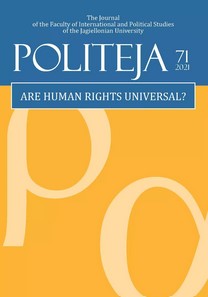ARE UNIVERSAL HUMAN RIGHTS UNIVERSAL?
ARE UNIVERSAL HUMAN RIGHTS UNIVERSAL?
Author(s): Ildus Yarulin, Evgeny PozdnyakovSubject(s): History of Law, International Law, Human Rights and Humanitarian Law, Politics and law, WW II and following years (1940 - 1949), Post-War period (1950 - 1989), Comparative Law
Published by: KSIĘGARNIA AKADEMICKA Sp. z o.o.
Keywords: human rights; universality; Universal Declaration of Human Rights; national traditions and customs;
Summary/Abstract: One of the issues constantly discussed in the context of human rights is their assessment as universal or relative. International human rights norms are universal, which corresponds to the nature of human rights. The process of universalization of human rights began after the second world war with the creation of the United Nations, whose Charter declared its determination to reaffirm faith in the fundamental rights of the individual, in the equality of men and women and in the equality of nations large and small. These intentions of the organization were confirmed by the adoption of universal documents: the International Bill of Human Rights, including the Universal Declaration of Human Rights of 1948, the International Covenants on Human Rights, opened for signature on December 16, 1966, and other acts. However, the problem lies in the fact that human rights recognized at the international level as universal and enshrined in international instruments, which must be respected by all and everywhere, lose the signs and qualities of universality under the influence of various socio-cultural, national traditions and customs, religious and other factors, and acquire the meaning or status of relative ones.
Journal: Politeja - Pismo Wydziału Studiów Międzynarodowych i Politycznych Uniwersytetu Jagiellońskiego
- Issue Year: 18/2021
- Issue No: 71
- Page Range: 67-77
- Page Count: 11
- Language: English

